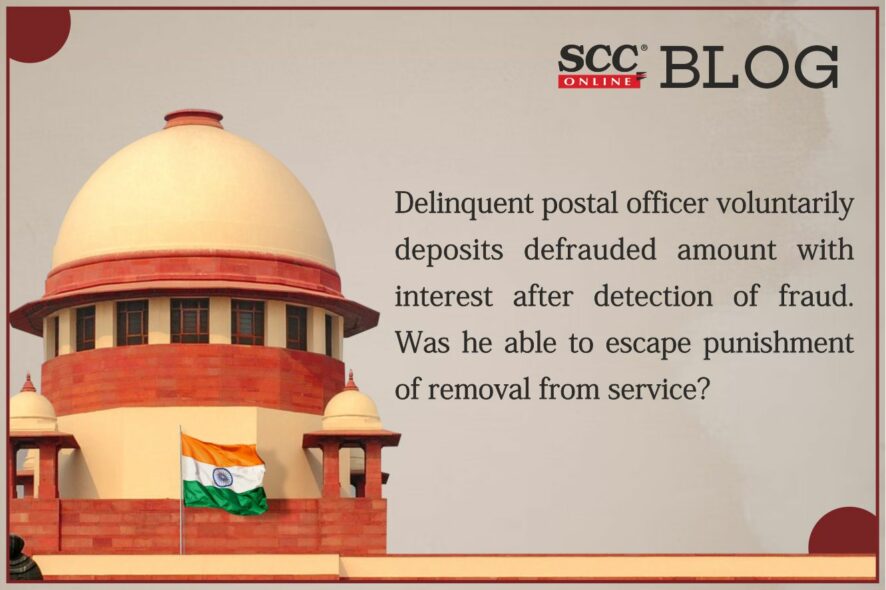Supreme Court: In a case where a Postal Assistant was accused of committing a fraud of Rs.16,59,065/- but had voluntarily deposited the defrauded amount along with penal interest, the bench of MR Shah* and BV Nagarathna, JJ has held that the same cannot be a ground to interfere with the order of punishment imposed by the Disciplinary Authority and substitute the same from removal to that of compulsory retirement.
The respondent in the case at hand, had, during the period from 2004 to 2007, committed fraud by way of fraudulent withdrawal in 85 RD accounts and by way of non-credit of deposits in 71 RD accounts and defrauded a sum of Rs.16,59,065/-. The Disciplinary Authority had imposed the punishment of removing the delinquent employee from service. The respondent, who had the experience of 39 years, admitted the charge of having defrauded Rs.16,59,065/- and on detecting the fraud, he deposited the defrauded amount of Rs.16,59,065/- along with penal interest.
The Central Administrative Tribunal as well as the Madras High Court, however, substituted the same from removal to that of compulsory retirement. Neither the Tribunal nor the High Court found any irregularity in conducting the departmental enquiry. No procedural lapses were found.
The Supreme Court, however, observed that if it were not for the detection of the fraud, probably, the respondent employee would not have deposited the defrauded amount. Once, a conscious decision was taken by the Disciplinary Authority to remove an employee on the proved misconduct of a very serious nature of defrauding public money, neither the Tribunal nor the High Court should have interfered with the order of punishment imposed by the Disciplinary Authority, which was after considering the gravity and seriousness of the misconduct.
The Court observed that,
“Merely because the respondent-employee had worked for 39 years and in those years, there was no punishment imposed and/or that he voluntarily deposited the defrauded amount along with penal interest and therefore there was no loss to the Government/Department cannot be a ground to interfere with the order of punishment imposed by the Disciplinary Authority and substitute the same from removal to that of compulsory retirement.”
It further said that neither the Tribunal nor the High Court have, in fact, considered the nature and gravity of the misconduct committed by the delinquent officer. Therefore, both, the Tribunal as well as the High Court had exceeded in their jurisdiction in interfering with the quantum of punishment imposed by the Disciplinary Authority.
Holding that no sympathy on such an employee was warranted, the Court observed that,
“Being a public servant in the post office, the delinquent officer was holding the post of trust. Merely because subsequently the employee had deposited the defrauded amount and therefore there was no loss caused to the department cannot be a ground to take a lenient view and/or to show undue sympathy in favour of such an employee. What about the loss caused to the department by way of goodwill, name and fame of the department and its reliability amongst the public? By such a misconduct/act on the part of the delinquent officer, the reputation of the department had been tarnished.”
Hence, the impugned judgment and order passed by the High Court as well as the order passed by the Tribunal substituting the order of punishment from removal to that of compulsory retirement was quashed and set aside and the Disciplinary Authority’s order of removal from service was restored.
[Union of India v. M. Duraisamy, 2022 SCC OnLine SC 464, decided on 19.04.222]






